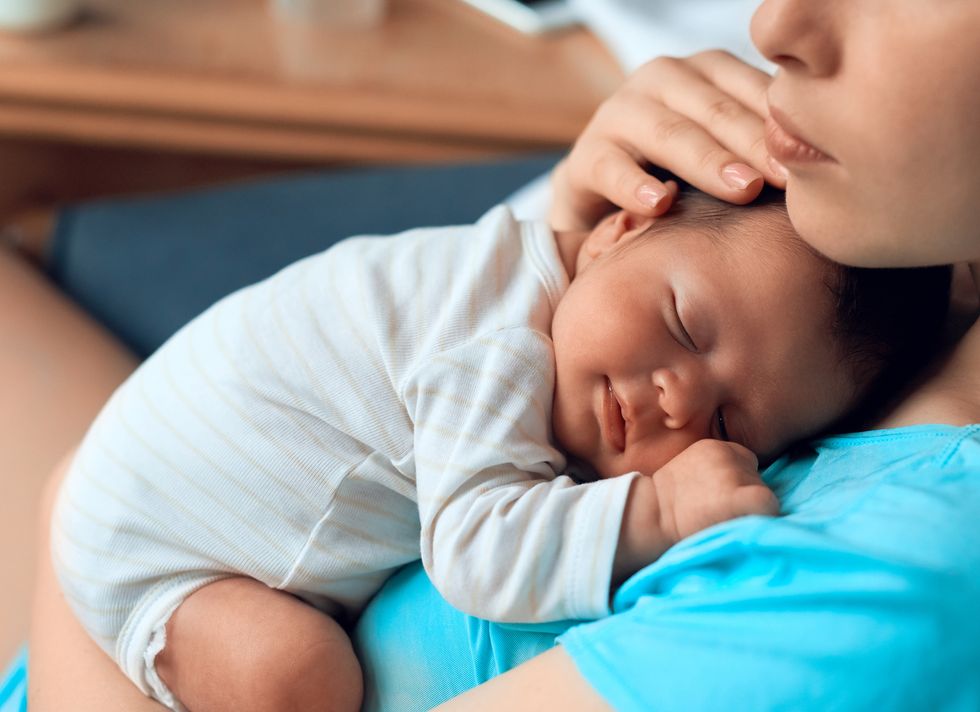Kit and Larissa Cutler's extended family were looking forward to welcoming the couple's first child to the world.
The pregnancy was a joyous surprise after years of infertility. Kit's mom planned to travel from Florida to California for the baby's birth. Larissa's parents planned to come from Brazil and help. And they expected Larissa to spend at least three nights in the hospital after her scheduled C-section.
The Covid-19 pandemic changed everything.
After the family decided traveling was too risky, Kit's and Larissa's parents cancelled their trips. Alone but together, Kit and Larissa welcomed baby Finn on April 10, 2020.
Two days later, they asked their doctor if they could go home early. Finn was fine. So was Larissa. And neither Larissa nor Kit wanted to spend any more time than necessary in a medical institution that was also providing care to people with Covid-19, the respiratory illness caused by the novel coronavirus.
"In normal life, the maternity floor was kind of like a party — visiting friends and family, balloons, flowers, gifts and enormous amounts of food being delivered," said Beth Battaglino, RN-C, a maternal child nurse at Riverview Medical Center and CEO of HealthyWomen.
Thanks to Covid-19-related restrictions on hospital visitors, new parents now spend most of their time alone in their room, and in an effort to minimize potential coronavirus exposure, new moms are being sent home earlier than usual.
The American Journal of Obstetrics and Gynecology MFM recommends discharging women within 24 hours of delivering vaginally and within 48 hours of a C-section during the pandemic.
Are mom and baby ready to go home?
Before the coronavirus pandemic, new moms usually stayed in the hospital two nights after a vaginal birth and three to four nights after a C-section, according to Diana Spalding, Motherly's digital education editor, a nurse midwife and author of The Motherly Guide to Becoming Mama.
Those lengths of stay were largely based on the 2008 Newborns' and Mothers' Health Protection Act, which set guidelines for health insurance plans. However, going home earlier was always an option, and Spalding said that moms who have uncomplicated deliveries at a birth center often go home within 12 hours of childbirth.
Spalding and Battaglino outlined the criteria that should be taken into consideration when deciding whether to discharge a new mother.
"If a woman has a vaginal birth, we want to make sure that her bleeding is under control — no heavier than a regular period," Spalding said.
The mother's uterus should feel firm, not soft and squishy, and her pain should be well controlled with over-the-counter medication.
C-section mamas should also feel relatively comfortable before discharge. Their incision area will likely still feel sore, but mama should be able to move around well and the incision itself should look healthy — edges pulled together without redness (except perhaps at the staple insertion points) or an odorous discharge. Both mom and baby should have stable vital signs and feeding (breast or bottle) should be going well.
Importantly, the family should feel ready to go home.
"Some people are desperate to get out of the hospital or birth center," Spalding said. "Some are going to feel scared and overwhelmed, and that will be taken into account."
Battaglino added that new moms don't have to be discharged in 24 hours, but it's an option.
Kit Cutler said the hospital gave them a sticker featuring a 24-hour hotline they could call with questions, and their baby was scheduled to see their pediatrician for an in-person check-up 48 hours after discharge.
What to watch for at home
One effect of shorter maternity ward stays is that new moms are missing out on the professional monitoring and support they normally receive for the first few days post delivery. For those who opt to go home early, it's important to carefully monitor the health and well-being of mom and baby.
The March of Dimes has a comprehensive list of warning signs of complications after birth. If you have any of the symptoms or signs on the list, contact your healthcare provider.
In addition to closely monitoring your physical health after birth, it's equally important to monitor your mental health. It's not uncommon for new moms to get the "baby blues" (which is characterized by wide mood swings) in the first few days postpartum. About 70% to 80% of new mothers will experience mood swings and even negative emotions after giving birth.
Roughly 15% of new mothers will experience the more severe postpartum depression, which can include thoughts of hurting yourself or your baby. (This number can be higher among Black women.)
But new moms don't have to suffer. Postpartum depression can be treated with medication and therapy.
Building a system of support
Because of the pandemic's social distancing requirements, many new parents who would normally arrive home to the waiting arms of extended family are now on their own. Alone doesn't have to mean unsupported, though. There are many ways friends and family can help, from dropping off groceries to coordinating a meal train.
"Now is the time to delegate," Battaglino said. "Family and friends want to help and feel a part of this special time."
You can also find support online. Many lactation consultants, physicians and counselors now offer virtual visits. You can also find support groups to hold your hand, virtually, at three a.m.
Two weeks after returning home, Kit and Larissa are glad they opted for an early discharge.
"It's been a good experience for us," Larissa said. "Kit, the baby and I couldn't be better."
Resources:
March of Dimes
Postpartum Support International 800-944-4773 (PSI's toll-free helpline, in English and Spanish)







